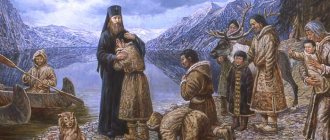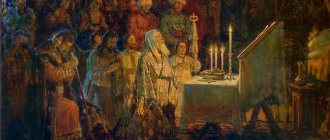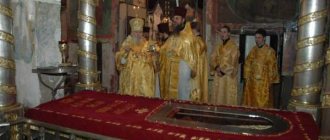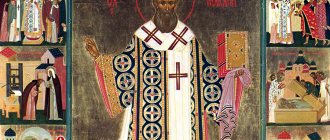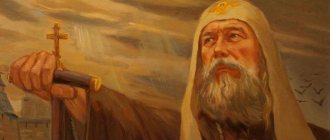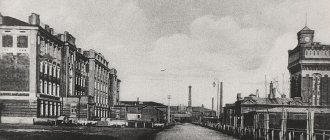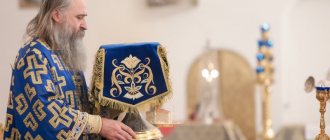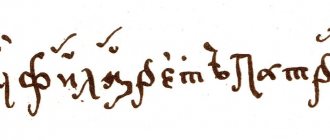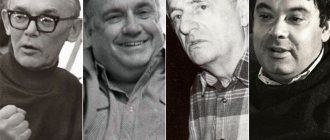| St. Job of Moscow. Miniature of the Tsar's title book, 1672 |
Job
(+ 1607), first Patriarch of Moscow and All Russia, Saint Commemorated April 5 (transfer of relics), June 19, in the Cathedrals of Moscow Saints, as well as Moscow and Tver Saints
In the world, John was born into a family of townspeople in the city of Staritsa, Tver province, was brought up in the Staritsa monastery and around 1553 took monasticism here.
In 1571 he was transferred to Moscow as abbot of the Simonov Monastery and gained the favor of Ivan the Terrible, whom he often accompanied on trips to monasteries. Elevated to the rank of archimandrite.
In 1575 - 1580 - abbot of the Novospassky Monastery.
On April 16, 1581, he was ordained Bishop of Kolomna.
From January 9, 1586 - Archbishop of Rostov.
From December 11, 1586 - Metropolitan of Moscow and All Russia, and soon after - the first All-Russian Patriarch. Being extremely meek and compliant, he was convinced to accept the primate service by the highest officials of the state - Job’s nominee is usually called the powerful boyar Boris Godunov, who did not like the previous Metropolitan Dionysius. They also point to the tsar himself, the blessed Theodore Ioannovich, who “forced Job to the great metropolis,” and then chose him from three candidates for the patriarchate elected by the Council at the beginning of 1589.
| Job, Patriarch of Moscow and All Rus' |
Patriarchate
On January 23, 1589, with the participation of Patriarch Jeremiah II of Constantinople, the naming took place, and on January 26, the solemn installation of Metropolitan Job as Patriarch of Moscow and All Rus' took place.
The entire people joyfully accepted this significant event in the history of the Russian Church and state. In 1590, at the Council of Eastern Hierarchs, the canonical independence of the Russian Church was approved. The Russian Patriarch was assigned the fifth place in the diptych of Patriarchs - after Jerusalem.
Saint Job took this important post, but did not play any noticeable role either in church or in national life. In many ways, Job put himself into the hands of Godunov, in whose interests he acted. However, as an enemy of all innovations, Job opposed the establishment of a university in Russia, conceived by Boris.
Patriarch Job performed the Divine Liturgy daily, reciting the Gospel, Psalter and Apostle by heart. “In his days there was not found a man like him, neither in form, nor in character, nor in voice, nor in rank, nor in walk, nor in question, nor in answer,”
- notes his biography.
Under St. Job, many Russian saints were glorified: Basil the Blessed, St. Joseph of Volotsk (the saint himself wrote a canon for him and “corrected the service”), Saints of Kazan Gury and Barsanuphius, Right-Believing Prince Roman of Uglich, St. Anthony of Rome and Cornelius of Komel, Blessed John of Moscow, Reverends Ignatius of Vologda and Martyry of Zelenetsky.
Much of his work was aimed at the spiritual development of the people, the dissemination of the Holy Scriptures and patristic books. Particularly important was the printing of liturgical books begun by the saint, which were in short supply everywhere, and especially in the newly enlightened lands of the Volga region and Siberia. With the blessing of Saint Job, the following were published for the first time: the Lenten Triodion (1589), the Colored Triodion (1591), the Octoechos (1594), the General Menaion (1600), the Official of the Bishop's Ministry (1600) and the Service Book (1602). Patriarch Job was the first to put the business of printing on a broad basis.
Saint Job used his personal funds and rich royal gifts for works of mercy and the construction of churches. In Moscow alone, between 1592 and 1600, twelve churches were built, and the Donskoy, Zachatievsky and Ivanovo monasteries were founded. Temples and monasteries were built in Siberia and other dioceses. Under Saint Job, active missionary activity was carried out in remote areas of the state, and the Pskov, Astrakhan and Korel dioceses were re-established. The seeds of Orthodoxy, sown by Patriarch Job, later bore their spiritual fruits, thanks to which the northern and southern borders of the Russian state were preserved and strengthened.
| St. Job of Moscow |
Career
If the concept of “career growth” is applicable to clergy, then we can say that Job quickly walked up the steps of the career ladder, without having any secret claims to occupy important positions. He simply carried out his duties honestly and zealously.
One day Ivan the Terrible arrived at the monastery. His visit was probably not an accident: Staritsa was one of the centers of the oprichnina established by Ivan the Terrible. For the biography of the future saint, this event was of exceptional importance: the stern king honored the diligent young monk with his attention. The sovereign liked him for his honesty, conscientiousness in the performance of his duties, and piety. Soon after the royal visit, Job was appointed abbot of the Staritsky monastery.
After some time, Job becomes an archimandrite. The year 1571 became another important milestone in the biography of the saint: he was invited to Moscow, offering to take the post of abbot of the Simonov Monastery. Job agreed.
Job later became Bishop of Kolomna, and then Archbishop of Rostov.
Shortly before the onset of the Time of Troubles, which was difficult for Russia, the future patriarch became the closest ally of Boris Godunov. Finally, he was elected metropolitan by the council of bishops.
In 1589 he became the 1st Russian Patriarch.
Time of Troubles. Resistance to False Dmitry and deposition.
With the death of Tsar Theodore Ioannovich in 1598, the male line of the Rurik dynasty was cut short, and a period of state unrest began, known in Russian history as the Time of Troubles.
Patriarch Job, being already old and sick, drew up accusatory letters in which False Dmitry I was named by his real name, the fugitive monk Grigory Otrepyev, a deceiver and impostor. These letters sobered up many, but False Dmitry managed to enlist the support of Poland and the Vatican, promising to introduce a union in Russia. In January 1605, Patriarch Job anathematized False Demetrius and the traitors who supported him. On April 13, 1605, Tsar Boris Godunov died suddenly. A riot broke out in Moscow, the city was surrendered to the impostor and the Poles. Patriarch Job refused to swear allegiance to False Demetrius and was deposed.
During the service, a crowd of armed people burst into the Assumption Cathedral, grabbed Job, tore off his vestments, dressed him in a black cassock and took him to the Staritsky Assumption Monastery.
In 1607, Job came to Moscow, at the request of Vasily Shuisky, “to resolve the perjury of the Russian people,” who betrayed their rightful Tsar Boris, gave this permission, and returned to his monastery.
He died on June 19, 1607 and was buried at the western doors of the Assumption Cathedral of the Staritsky Monastery. Subsequently, a chapel was built over the saint’s grave.
In 1652, by decree of Tsar Alexei Mikhailovich, the incorrupt and fragrant relics of St. Job were transferred to Moscow and placed near the tomb of Patriarch Joasaph (1634-1640). Healings occurred from the relics of Saint Job.
In addition to various kinds of letters, consoling messages and teachings written by Job, his “Tale of the Honest Life of the Faithful and Noble Tsar Fyodor Ivanovich” has reached us, distinguished by its panegyric character, but interesting due to the characteristics contained in it of the Tsars Fyodor and Boris, to whom Job belongs with extreme sympathy.
The veneration of Patriarch Job as a saint is noted in various pre-revolutionary manuscripts and hagiographic publications. In the second half of the 18th century, between the wall images of the Novospassky Monastery Cathedral there was an image of Patriarch Job. At the end of the 19th century, under Archbishop Demetrius (Sambikin) of Tver, the day of the death of Patriarch Job was remembered in all the city churches of the Tver diocese. At the same time, with the blessing of Archbishop Demetrius, an icon of the Tver saints was painted, on which His Holiness Patriarch Job was depicted. The completion of the canonical and liturgical design of the veneration of the memory of St. Job has occurred in our days. First, with the blessing of His Holiness Patriarch Pimen and the Holy Synod, the name of St. Job was included in the Council of Tver Saints (1979), and at the Council of Bishops of the Russian Orthodox Church on October 9, 1989, church-wide veneration of the saint was established.
Troparion
May the Church of Christ triumph / and may the city of Moscow rejoice, / as the lamp of the Russian land has risen, / in the confession of the truth, the unshakable Job the Patriarch, / through his prayers. Lord, / eradicate all the temptations of this world and heresies, / instruct people in piety / and establish them in Orthodoxy.
Job, Patriarch of Moscow and All Rus'
P. I. Geller. Patriarch Job refuses to recognize False Dmitry I as the son of Ivan IV
Patriarch Job (c. 1525 - June 19 (29), 1607) - the first Patriarch of Moscow (1589-1605). Author of “The Tale of the Life of Tsar Theodore Ioannovich”, messages, letters and speeches.
Researchers explain Job's amazing career from an unknown monk of a provincial monastery to the high priest of Russia and patriarch, first of all, by the special favor of three Russian tsars towards him: Ivan IV, Fyodor Ivanovich and Boris Godunov.
The future Patriarch came from the townspeople of the city of Staritsa, Tver province, where he was born in the 30s of the 16th century. In the world he bore the name John. His teenage years were spent in the Staritsky Assumption Monastery, where his father sent him to receive his primary education. His monastic upbringing aroused in him a desire to serve God in a monastic form. But around 1553, when John completed his studies at the monastery, his father decided to marry him. On the wedding day, the young man asked his parents to go to the monastery for a conversation with the spiritual elder. Coming to Archimandrite Herman, he begged the elder to tonsure him as a monk.
Saint Job spent more than 15 years in the Staritsa monastery, moving from a novice to Elder Herman to abbot. Around 1569, Tsar Ivan the Terrible visited the Staritsa monastery; Monk Job attracted his favorable attention and was soon elevated to the rank of archimandrite.
Patriarch Job, Boris ZVORYKIN
In 1571, Archimandrite Job was appointed abbot of the Simonov Monastery in Moscow. In 1572, and later in other years, he was a participant in church councils. In 1575, Saint Job was appointed rector of the Novo-Spassky Monastery and for six years headed the ancient Moscow monastery. In 1581, Archimandrite Job was ordained Bishop of Kolomna. In 1586 he became Archbishop of Rostov the Great and in 1587 - Metropolitan of Moscow.
When on January 26, 1589, the long-standing desire of the Russian government to eliminate the formal subordination of the Russian Church to Constantinople was realized, out of three candidates, Tsar Fyodor Ivanovich chose Job as the spiritual leader of the country.
On January 23, 1589, with the participation of Patriarch Jeremiah II of Constantinople, the naming took place, and on January 26, the solemn installation of Metropolitan Job as Patriarch of Moscow and All Rus' took place.
Under Patriarch Job, new Russian saints were glorified: Basil the Blessed, St. Joseph of Volokolamsk (the saint himself wrote a canon for him and “corrected the service”), Saints of Kazan Guriy and Barsanuphius, Right-Believing Prince Roman of Uglich, St. Anthony the Roman and Cornelius, Blessed John of Moscow, St. Ignatius of Vologda and Martyry of Zelenetsky. For some saints already revered in Rus', new days of celebration were established.
Patriarch Job used his personal funds and rich royal gifts for alms and for the construction of churches. In Moscow alone, 12 churches were built between 1592 and 1600.
Boris Godunov, patriarch and boyars, Vladimir FAVORSKY
Saint Job was a zealous servant of the Church and a wise shepherd. These features were especially evident in his missionary activities aimed at strengthening the Orthodox faith in remote areas of the state (in Siberia, the Russian North), as well as in Georgia. At the request of the king of Kakheti, Alexander (Georgia of the same faith was already at that time seeking an alliance with Russia and asking for a protectorate), Patriarch Job sent several clergy and icon painters there. With his blessing, Orthodox missionaries revived churches and monasteries on the outskirts of Russia. Several new monasteries were founded in the European part of the country, and the Donskoy Monastery was created in Moscow.
With the death of Tsar Theodore Ioannovich in 1598, the male line of the Rurik dynasty was cut short, and a period of state unrest began, known in Russian history as the Time of Troubles. In these difficult times, Saint Job retained true Christian patience, fearlessness and courage. He was actually the first to lead the Russians’ opposition to the Polish-Lithuanian invaders, sending letters to cities calling for the defense of faith and the Fatherland. These letters sobered up many sensible people, but False Dmitry managed to enlist the support of Poland and the Vatican, promising to introduce a union in Russia, and entered Russia with a considerable army. In January 1605, Patriarch Job anathematized False Dmitry I and the traitors who supported him. The High Hierarch and prayer book for the entire Russian people, Saint Job fearlessly denounced the destroyers of state order, who brought disorder into the Church of God.
Place of Execution, Boris ZVORYKIN
Meanwhile, False Dmitry quickly advanced towards Moscow. On April 13, 1605, after the sudden death of Tsar Boris Godynov, a riot broke out in Moscow, the city was surrendered to the impostor and the Poles. Patriarch Job, who refused to swear allegiance to False Dmitry, was deposed. In June, supporters of the impostor destroyed the Patriarchal Court and broke into the Assumption Cathedral of the Kremlin to kill the Patriarch.
The rioters attacked the Patriarch, tore off his holy vestments and did not allow him to finish the Liturgy, beat him and dragged him with dishonor to the Place of Execution. Having endured much reproach, Saint Job, exhausted, was exiled to the Staritsky Monastery, where he had once begun his monastic feat. Patriarch Job lived in the monastery for two years. Weakened and losing his sight, he spent all his time in prayer.
After the overthrow of False Dmitry I, Saint Job, due to weakness, could not return to the First Hierarchal Throne. In his place, he blessed Metropolitan Hermogenes of Kazan.
Patriarch Job died peacefully on June 19, 1607 and was buried at the western doors of the Assumption Cathedral of the Staritsky Monastery. Subsequently, a chapel was built over his grave. In 1652, under Patriarch Joseph, the incorrupt and fragrant relics of Saint Job were transferred to Moscow and placed next to the tomb of Patriarch Joasaph (1634-1640). Many healings occurred from the relics of Saint Job.
What caused the kings’ favor towards Job can be partly understood from the “History of the First Patriarch Job of Moscow,” which was written in a hagiographic style by an unknown author in the mid-50s. XVII century and serves as the main source of biographical information about Job (RIB. SPb., 1891, vol. 13, stb. 923–950). From it it turns out that Job had a set of qualities that distinguished him favorably from those around him. First of all, his high level of education is indicated. Then the extraordinary memory is emphasized.
The reason for the rise is revealed in the works of Job himself: in speeches and messages to Fyodor Ivanovich and Tsarina Irina, in “The Tale of the Life of Tsar Theodore Ioannovich.” It is revealed even more clearly in Job’s appeals to Boris Godunov and in the outstanding role he played in Godunov’s election to the throne. As the Spiritual head of the state, which was left without a tsar after the death of Fyodor Ivanovich, Job not only organized the convening of the consecrated and zemstvo councils, but, using his position and authority, actively influenced their decision favorable to Godunov. On his initiative, a procession with icons was taken to the Novodevichy Convent to demonstrate the nationwide election of Godunov. The preparation of documents on the election of Godunov as king also took place under the leadership of Job.
Chronicler, Boris Zvorykin
Loyalty and devotion to the kings Ivan the Terrible, Fyodor and then Boris, unconditional support for their socio-political endeavors well explain the appearance of Job on the patriarchal throne. He did not betray Tsar Boris even after his death, supporting with all his might the young Fyodor Borisovich Godunov. Neither the attempts of False Dmitry I to attract Job to his side, nor the threat of defrocking forced him to abandon the revelations of Grigory Otrepyev in letters and in public speeches, therefore, by order of the impostor, Job was sent to his homeland, to the Staritsky Assumption Monastery. In 1607, Job, blind and decrepit, once again appeared in Moscow, where, at the request of Tsar Vasily Shuisky and the new Patriarch Hermogenes, Muscovites begged him for forgiveness for his exile.
The literary activity of Patriarch Job has not been fully clarified. Only “The Tale of the Life of Tsar Theodore Ioannovich” has been studied in sufficient depth. His role in the literary process of the late 16th and early 17th centuries has not received due appreciation. as the main ideologist of the country, although the facts eloquently indicate that Job had a great influence on contemporary literature and on the literature of later times. Not a single writer of the first half of the 17th century, dealing with the events of the beginning of the century, could do without those characteristics of the political situation and Grigory Otrepyev, his intention to “trample the peasant faith and bring and destroy the Orthodox peasants into the Latin and Luthor heresy,” which are contained in Job’s letter dated January 14, 1604 to the Solvychegodsky Vvedensky Monastery.
The conciliar definition and the Approved charter on the election of Boris Godunov to the kingdom (AAE. St. Petersburg, 1836, vol. 2, nos. 6–7), written under his leadership, if not by Job himself, served as a source and literary model for the Approved charters of Vasily Shuisky and Mikhail Fedorovich Romanov, in which ideological coverage of the “Troubles” was developed. Job’s role in the creation of the chronicle of the Time of Troubles, known to V.N. Tatishchev but subsequently lost, “Joseph’s History of the Russian Ruin,” remains unclear. Elder Joseph was I.’s cell attendant, enjoyed the unlimited trust of the patriarch, and worked with literary and documentary materials from the richest patriarchal library.
The stylistic features of Job's works indicate his obvious attraction to the artistic style of the school of Metropolitan Macarius with its panegyric portraits, solemn emotionality, complex syntactic constructions, and heavy, flowery language.
Among all the works of Job, the consoling message to Queen Irina stands out in theme and style. After the death of her long-awaited but quickly deceased child, Princess Feodosia, Irina experienced unbridled despair for a long time. Trying to find the most intelligible words, I. even introduces colloquial speech into the message, which is completely unusual for his works, written exclusively in book language. So, exhorting Irina to come to her senses and pull herself together, because the princess cannot be returned anyway, he says: “but with a twist, empress, you can’t take anything” (GPB, O.IV.17, l. 21 vol.).
“St. Patriarchs Hermogenes and Job perform the Rite of Penance in the Assumption Cathedral of the Moscow Kremlin in 1607.” Natalya Klimova. Illustration for the book “Lives of Saints for Children. Holy men"
“The Tale of the Life of Tsar Theodore Ioannovich,” written before 1604, contains an idealized biography of this king. In terms of the tasks that Job set for himself, and in terms of artistic characteristics, it represents, as it were, the final chapter of the Degree Book. Tsar Feodor is the only one of the direct descendants of Ivan Kalita who was not included in this set of hagiobiographies of Russian sovereigns, because the Degree Book was completed during his father’s lifetime. Job's plan to fill this gap arose in connection with the fact that with the death of Tsar Feodor the Rurik dynasty ended. However, in “The Tale of the Life...” this fact is not given the significance that it had in life. Job tried to obscure the importance of the event, not allowing the slightest mention of the brutal political struggle in the aristocratic circle of the king throughout his reign. In his presentation, no problems can arise due to the death of the last son of Ivan the Terrible, since the issue of succession to the throne was resolved by Fedor himself long before his death. After the victory in 1591 over the Crimean Tatars near Moscow, the tsar presented Boris Godunov with a gold-plated chain, “symbolically on it, prefiguring the royal perception of his property and the entire great kingdom of the Russian Scythian kingdom.” The theme of Boris Godunov's exceptional talents, closeness to the Tsar and loyalty to him runs through the entire Tale and determines its peculiarity. Being a posthumous praise to Tsar Feodor, it is at the same time a panegyric to Godunov. “The Tale of the Life...” was used in the creation of the New Chronicler, and in the manuscripts of the mid-17th century. it is found in the Degree Book as its last degree.
Patriarch Job. miniature of the Tsar's titular title
Lit.: Karamzin N. M. History of the Russian State. SPb., 1824, t. 10, 11; Zhmakin V.I. Metropolitan Daniel and his works // CHOIDR, 1881, book. 2, p. 756–757; Eleonskaya A. S. and others. History of Russian literature of the 17th–18th centuries. M., 1969, p. 20–22; Pavlov A.P. Conciliar approved document on the election of Boris Godunov to the throne // Ibid., Leningrad, 1978, issue. 10, p. 206–225. G. P. Enin Job (patriarch) // Russian biographical dictionary: in 25 volumes. - SPb.-M., 1896-1918. Job // Orthodox Encyclopedia. Volume XXV. - M.: Church-scientific, 2011. - P. 253-264. — 752 p.
Portraits of figures in similar areas of activity:
Boris Vladimirovich, Prince of Rostov... Metropolitan Hilarion of Kiev... Yaroslav the Wise, Prince of Novgorod and Grand Duke... Oleg Ivanovich, Grand Duke of Ryazan... Boris and Gleb Fedor I Ioannovich, Tsar and Grand Duke of All Rus'... Igor Olgovich, Prince of Chernigov... David Svyatoslavich, Prince Chernigov... Hermogenes, Patriarch of Moscow and All Rus'... Vladimir Yaroslavich, Prince of Novgorod... Joachim, Patriarch of Moscow and All Rus'... Gleb Vladimirovich, Prince of Murom... Joseph Volotsky
Kyiv Union
The Russian aristocracy of that time had long wanted an independent Church for itself, which had been organized since the fall of Constantinople in 1453. At the same time, the Kiev Metropolis finally went under Lithuania, becoming a part of the Orthodox Church absolutely independent from Moscow.
The Jesuits, in particular Peter Skarga, actively influenced it, persuading the Kievites to union, which happened already in 1596 in Brest. Skarga's writings about the “unworthiness” of Constantinople and the strength and freedom of Rome reached Moscow. Muscovites didn’t like all this, but they didn’t want to be under the rule of Rome either. After all, not long ago Ivan the Terrible deceived and kicked out Antonio Passino, the Jesuit who proposed such a project to the Russian Tsar.
However, the current situation of the Russian Church did not suit Rus' in any way. But it was very tempting to annex the independent Kyiv metropolis due to the rise of the Moscow metropolis (which, by the way, eventually happened).
Russian Patriarchate
The historian of the Russian Church, Kartashev, points out that from a political point of view, the establishment of the patriarchate in Rus' by Godunov gave him a huge credit of trust and respect from the nobility, and from the whole society as a whole. Moreover, Metropolitan Job was precisely “Godunov’s man”, who began his rise, like the future tsar, from the oprichnina of Ivan the Terrible.
The active phase began in 1586, when Patriarch Joachim of Antioch arrived in Moscow after a visit to the Kyiv Metropolis. He came to ask for money, and this was the first personal visit in Russian history by one of the heads of the Eastern Churches. Joachim was generously rewarded and sent back to Turkey, but with instructions that he negotiate the possibility of installing a patriarch in Rus'.
Naturally, such prospects were not lost at all on Constantinople and the local patriarch. I didn’t want to lose, even formally, such a huge metropolis. But, as mentioned above, Theoliptus loved money very much and did not know how to spend it at all, which also played a role.
The Patriarch of Constantinople began to “delay the process.” And at the same time, the number of people asking for gifts and money from the East to Moscow has increased significantly. Moscow endured, gave and hoped. Theoliptus, apparently, did not try to take any active action, but then, due to his extravagance and inept intrigues, he was removed, and his place was taken by Patriarch Jeremiah II, returned from exile by the Sultan.
He found the Church of Constantinople in such ruin and debt that he was forced to live in the house of the Wallachian rulers. The patriarchal residence was confiscated for debts. At the same time, he knew nothing about the “Moscow project”, but it was to Moscow, already along the woven path, that he went to beg.
Job's two letters
Rumors, however, circulated among the people, and intensified the more the problems were brewing in the Russian state under Godunov. But there were problems with crop failures and unresolved consequences of the division of lands during the oprichnina period, and the very legitimacy of the “unborn” tsar aroused popular suspicion and fear. In turn, Tsar Boris, realizing the precariousness of his position, initiated repressive processes, guessing around, like Ivan the Terrible, betrayals and conspiracies.
And so in 1603, False Dmitry I entered the political arena, proclaiming himself a miraculously saved prince. The Poles, who had plans for Moscow and a dominant role in the entire Slavic world, and the Jesuits, who saw in him an opportunity to conclude the Russian Church in a union, took his side.
Job was already 78 years old at the time, but it was he who spoke out against it. The first thing the patriarch did was send two letters, one to the Rada of the Polish Crown, in which Job reported that False Dmitry was, in fact, a runaway monk, Grigory Otrepiev. It was from Job that this version of the impostor’s personality came.
And the second letter was addressed to the military head of the Polish-Lithuanian Commonwealth, Prince Konstantin Ivanovich Ostrozhsky, with a call to identify Otrepiev as the impostor, since the prince was personally familiar with the stripping, and to arrest him. But the Poles, in general, did not care much about the personality of False Dmitry, they had already bet on him, and were not going to give up their plans for Moscow.
Eminence grise
Very interesting times also reigned in our country itself. The youngest son of Ivan the Terrible, Fyodor Ioannovich, was not a strong and decisive politician. His father also spoke of him as more suited for the cell and prayer than for ruling the state.
But his closest supporter was Boris Godunov, a native of the guardsmen, the Tsar’s brother-in-law. He quickly eliminated all his competitors, who until recently had been his supporters in placing Tsar Feodor on the throne, and became a sort of “gray eminence of all Rus'.” Historians note that out of the 14 years of Feodor’s reign, Godunov ruled 13 undividedly and virtually undisguisedly.
However, it is worth mentioning that this was not the worst reign. Paradoxically, while Godunov was in the shadows, he was much more successful and useful to Russia than when he himself became tsar. Whether he planned from the very beginning to become a Russian autocrat and found a new dynasty is unknown. However, judging by historical data, he perceived the project of “Russian patriarchate” as a deeply personal matter, to the success of which he made considerable efforts.
Activity
In the history of Russia, the years of Job's stay at the pinnacle of spiritual power were marked by the active spread of the Christian faith in the Volga region and Siberia, the canonization of St. Basil, and the spread of literacy.
Job was engaged in book printing, strove to ensure that as many people as possible became acquainted with the covenants of Christ, and tried in every way available to him to strengthen Orthodoxy in Rus'. Since this task was made easier by teaching people to read and write, the patriarch advocated education.
He himself was engaged in writing theological treatises. His appeals to the people and to believers have been preserved. The highest officials of the state turned to him for help and support in difficult times. Thus, Irina, Boris Godunov’s sister, received a lengthy message of consolation from him after the death of her only, long-awaited and hotly mourned daughter. Job switched from the “high” book style, with which he usually composed his messages, to simple folk language, consoling the royal person.
Job managed to both provide assistance to private individuals and deal with matters important to the state. On his initiative, 4 metropolises appeared in Rus': Kazan, Novgorod, Krutitsa, Rostov. This made it easier for the highest spiritual authorities to monitor the territories under their control. Stone temples were built everywhere. Job himself invested in the construction personal funds granted to him by the kings.
Realizing that the unity of church and secular authorities could ensure the integrity and relative stability of the state, Job provided all possible assistance and support to the Godunovs - first Boris, then his son Fyodor.
Degradation of Byzantium
The fact is that after the capture of Constantinople by the Ottoman Turks, the degradation of the Ecumenical Patriarchate began. The sultans changed patriarchs at their discretion, like gloves. In Moscow, the Ecumenical Church began to be perceived as “weak, dependent,” and even openly “slavish” in relation to the Muslims of other faiths.
At the same time, the Universal Church suffered financially; the ancient Eastern Churches increasingly went to Rus' with an “outstretched hand.” But at the same time, representatives of these Churches boasted of their antiquity, greatness and independence, in contrast to the “Orthodox remake”, the Moscow Metropolis.
In addition, ecumenical patriarchs very often became frankly unworthy people, political intriguers, or even simply rakes and spendthrifts, which, for example, turned out to be Patriarch Theoliptus, during whose reign the “great Moscow intrigue” began to proclaim the patriarchate in Rus'.
Job's last mite
In 1606, after the overthrow of False Dmitry, Vasily Shuisky became king. Job was offered to return to the patriarchate, but he, citing old age and blindness, refused. However, he came to Moscow and concelebrated with the new patriarch, Hermogenes, who would also later become one of the key figures in the suppression of the Time of Troubles.
On November 20, 1607, during this joint service, Job brought public repentance and called the Russian people to it, declaring that Godunov was guilty of the death of Tsarevich Dmitry, and False Dmitry was really an impostor.
Characteristically, no one blamed Job for this “change of testimony.” Moreover, in “Essays on the History of the Russian Church” these events are described as follows: “the patriarch implored the people to be faithful to Tsar Boris, and now he absolves the people from these oaths and himself asks the people for forgiveness for them. Muscovites cried and kissed Job’s right hand.”
The importance of this political step is difficult to overestimate, since it broke not only the reputation of False Dmitry I, but also all subsequent impostors who followed. In fact, by this change in his words, Job showed that his personal sympathy for Godunov was inferior to his desire to strengthen and save the united Russian state and the Orthodox faith, on the altar of which he put all his strength, health and life.
